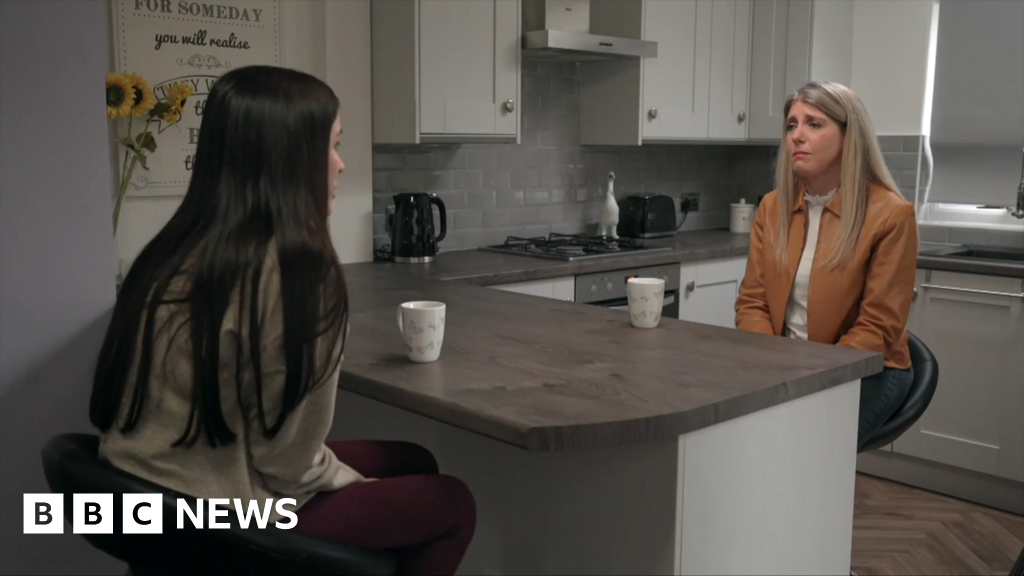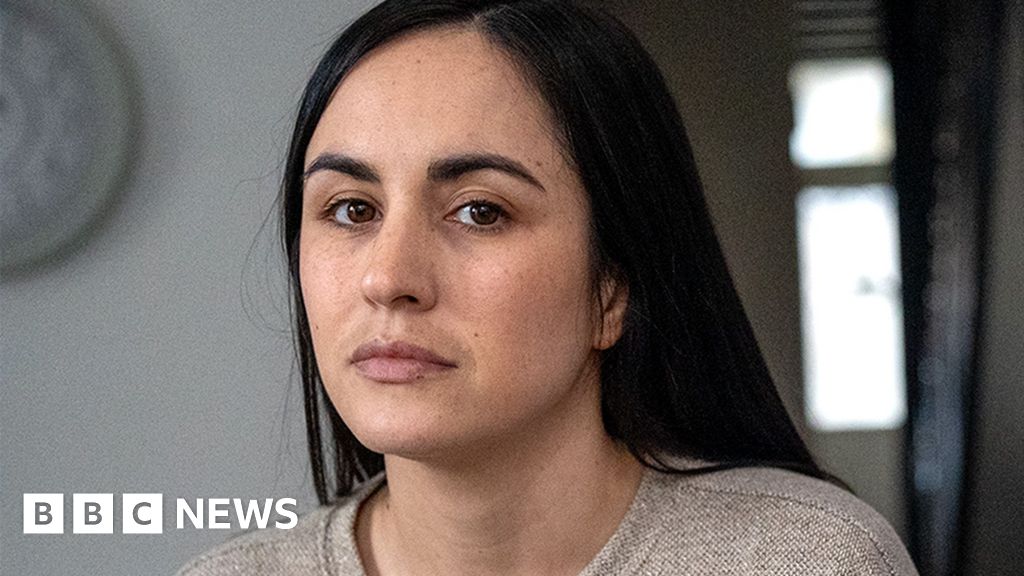Just now
Joanne MacAulay,BBC Scotland News

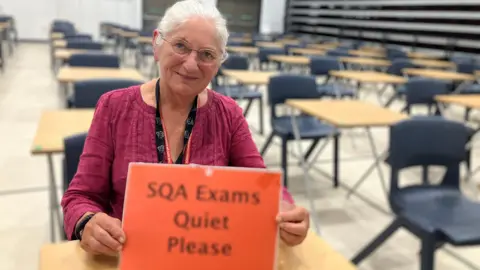 BBC
BBC
When the last exam of the Scottish 2024 exam diet - Gaelic Nat 5 listening - ends later, candidates, teachers and parents across the country will breathe a sigh of relief.
So will the army of people who have to make sure the logistics go smoothly and that nobody cheats.
They are the invigilators, who for six weeks each spring, run every aspect of the Scottish Qualifications Authority (SQA) assessments in more than 500 schools and colleges.
Dr Alex Laird is one of them.
The end of this year's exams mean the end of a quarter century of overseeing pupils as they sit their Highers and National 5s.

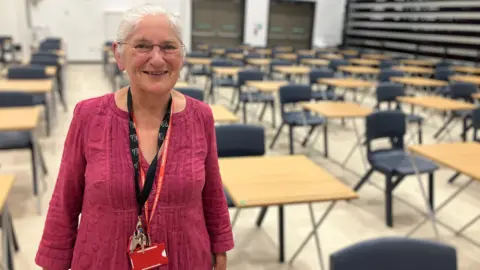
Dr Alex Laird is due to walk her last round of the exam room
Dr Laird is the Chief Invigilator at Portobello High School in Edinburgh where her key goal over 25 years has been to ensure everything is in place for the candidates to do their best.
"You have to have good organisational skills, attention to detail and it helps enormously if you have got a very good memory," she said.
"The candidates should simply be able to come in and sit the exam without any excitement or agitation for them."
She says many people assume that the job is a case of marching up and down ensuring people don't cheat. But there are also complex logistics involved.
And Dr Laird revealed that in her experience with thousands of candidates, she can count the number of people she has caught cheating on one hand.
'Special conditions'
She told BBC Scotland News: "There have only been three unquestionable incidents of breaking the rules with intent.
"One was in a modern languages exam where it struck me that one candidate appeared to be looking up an awful lot of words [in a dictionary] starting with A or B. But indeed it turned out they had notes tucked in there.
"The most recent one was a mobile phone in somebody's pocket which is clearly totally against the rules. Not only was it in their pocket, but it was on."
She added that these incidents were very rare and the overwhelming majority of candidates were polite, grateful and abide by the rules.
Another major change and additional challenge is in the rise in the number of candidates who need special conditions to sit their exams, such as using IT, getting extra time or having a separate room.
Dr Laird said: "It's no longer the concept that everybody goes into the school hall.
"This year we had 22 rooms on the go for Nat Five English.
"Also quite a lot of students need their exam paper to be slightly different from the standard version - such as a particular font or an enlarged print, or coloured paper.
"Some schools may need them to be in braille. So you must know exactly where that candidate is going to be because you need to get the correct paper to them."

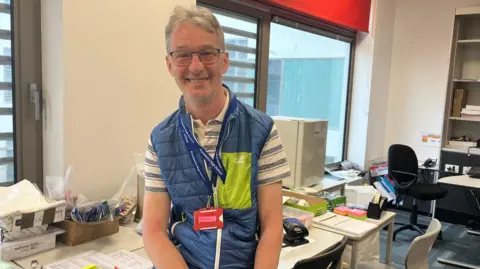
Bill Webster will take on the top job after Alex retires
Dr Laird also trains other invigilators and advises on what their responsibilities are - even down to their footwear.
She said: "Squeaky shoes would have driven me absolutely nuts when I was a candidate.
"Similarly jingling coins or keys in their pockets are a no-no.
"The role of an invigilator is to be there to try to prevent any problems and not to be causing them."
Dr Laird said it was wrong to stand or sit too close to a candidate.
She added: "You should be moving around.
"We are in charge of ensuring the candidates stick to the rules and that means the invigilators have to stick to the rules too."
Invigilators also have to deal with the occasional medical incident.
"We had one spectacular nose bleed some years ago.
"A member of staff had to sit with the gloves on and copy [the answers]out because you couldn't even put the paper in a photocopier.
"It can be really difficult in exam rooms to get the temperature right.
"Sometimes somebody's close to fainting with heat and, I'm afraid, people go beyond being merely nauseous and are ill."

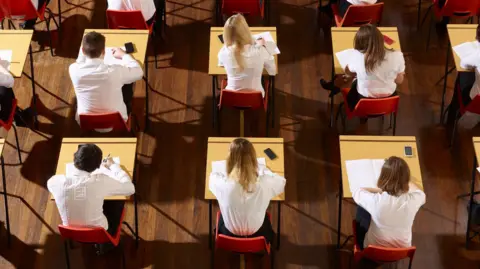 Getty
Getty
Dr Laird has only encountered three genuine cases of cheating in 25 years
Noise can also be a distraction which needs to be dealt with.
"You can get grass-cutting in summer or a drill outside.
"One early May, in mating season, a pair of pigeons on the roof of the hall were very obviously chatting each other up, let us say!
"It was impossible to ignore and all the candidates in the hall were very aware of that!"
Dr Laird is handing on her responsibilities to retired maths teacher Bill Webster, who has been invigilating for seven years.
He believes the role is key to the exams process running smoothly.
"We're a cog in a wheel and if there's a cog missing the whole things stops.
"I think you become more aware of the minutiae of the job and the things you need to remember year on year.
"I enjoy organising things. I worked in education for a long, long time and it seems like a continuation of that."
He added "By the end of May we are weary glad that it's over and gone well and hopefully that any problems that have come up have been resolved to the satisfaction of all concerned. "

 Google
Google
Dr Laird has kept a watchful eye over the pupils at Portobello High School for 25 years
Jacqui Faulds, head of appointee management at the SQA, said "Invigilators play an essential role in the delivery of the annual examination diet.
"Simply put, without their experience and contribution, exams in Scotland would not happen.
"We are indebted to colleagues like Alex and Bill, who give up their time each year to make sure learners have the best possible opportunity to demonstrate their knowledge and understanding on the day of the exam."
As she retires Dr Laird is now looking forward to seeing a bit more daylight from late April to the end of May but will miss the colleagues and candidates.
She said: "There is a satisfaction because you know that you are helping the next generation of young people to get to that point where they can go out into the world and go on to do whatever it is they want to do.
"Getting the results you want in an exam is a huge boost for self-confidence.
"Probably the best thing about the job is knowing that people did it for us and you're paying it forward. "

 8 months ago
32
8 months ago
32





